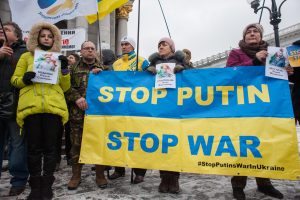It might seem late to discuss the Swiss-hosted Ukraine peace summit that took place on June 15-16. Still, it’s worth taking a look back at the intriguing Thai participation, which has been easy to lose sight of amidst Thailand’s flurry of important domestic political happenings.
An article published by Thai PBS last Friday pointed to a “peculiar situation that nobody wants to interpret too much and too soon,” of Thailand’s decision to join the exclusively pro-Ukraine summit, from which Russia was excluded, despite it being an active participant in the war, but then to refrain from endorsing the final joint communique. Beyond reiterating the United Nations General Assembly (UNGA) resolutions condemning Russian aggression, the communique called for the restoration of Ukrainian control over the Zaporizhzhia nuclear power plant and seaports in the Black and Azov seas, along with the exchange of all prisoners of war.
The article in question, penned by veteran Thai journalist Tulsathit Taptim, went on to speculate that Thailand, in light of its official bid to join the BRICS groupings, likely wanted to please Russia, the rotating chair of BRICS. Tulsathit’s speculation is convincing. It couldn’t have been by mere chance that on the same weekend as the peace summit at the Swiss resort of Bürgenstock, the leader of Thailand’s ruling Pheu Thai party, Paetongtarn Shinawatra, led a Thai delegation to the “BRICS and Partner-Countries (BRICS+)” forum in Vladivostok. More fundamentally, economic interests are central in Thailand’s foreign policy agenda under the current civilian-led Srettha Thavisin administration. Then there’s the fact that most nations that rejected the Bürgenstock communique were BRICS members.
Such “diplomatic flirting,” as Tulsathit termed it, isn’t a first for Thailand. At the UNGA in 2022, Thailand went from deploring Russia’s actions in March to abstaining from the October resolution denouncing the Russian annexation of four Ukrainian regions. This roller-coaster voting was almost undisputedly motivated by the Thai government’s short-term (and ultimately failed) goal of securing Russian President Vladimir Putin’s attendance at that year’s Bangkok-hosted Asia-Pacific Economic Cooperation leaders’ summit.
But that sorry episode at the UNGA occurred under the watch of the military-backed Prayut Chan-o-cha government. The Srettha government, with its “soft power” obsession, apparently cares more about Thailand’s international image. This, in turn, begs a question: Why would Thailand risk inviting further accusations of foreign policy inconsistency by doing what it did at the Ukraine summit?
Thailand could’ve arguably kept both Russia (and by extension, its strategic ally China) and the West content enough by skipping the Ukraine summit. There was no obligation to join in the first place, and missing it wouldn’t have been considered too scandalous for two reasons. First, not all Southeast Asian nations were expected to send a delegation. Indeed, more than half of the members of the Association of Southeast Asian Nations (ASEAN) didn’t show up, and there was a poor level of representation among those who did attend.
Second, given Thailand’s cordial relations with all sides and its lack of external adversaries more generally, Thai leaders – perhaps more than any of their ASEAN counterparts – have been sensitive about displaying a preference for any particular power bloc. This has at times resulted in Thailand donning the invisible cloak to avoid inviting problems, as seen in its absolute silence on the Australia-United Kingdom-United States (AUKUS) security pact. Rather than choosing sides, non-attendance at the Ukraine summit would have been regarded more or less as another instance of Thailand putting on its invisible cloak.
To curb the simplistic black-and-white narrative that Thailand is departing from the U.S.-led Western international order by seeking to join BRICS, Thai officials could have simply cited Bangkok’s simultaneous pursuit of Organization for Economic Cooperation and Development membership and ongoing engagement in initiatives like the Indo-Pacific Economic Framework to illustrate its balanced posture.
The assumptions above suggest that Thailand’s presence at the Bürgenstock gathering was more than just another clumsy dance between the two geopolitical blocs. If I’m not wrong and overanalyzing, Thailand also sought to subtly counter the modern and loud criticism that its foreign policy is excessively passive and reactive.
Thailand’s representative, Vice Foreign Minister Russ Jalichandra, is known as “the Alternative Ambassador” for his unorthodox practice of making frank (and sometimes controversial) comments on domestic and international developments. Dispatching such a strong character to Bürgenstock may have reflected Thailand’s growing resolve to become more proactive and assertive in international affairs.
Russ’ sole focus on the issue of food security in his remarks was not only due to its relatively uncontentious nature and inclusivity (the Black Sea Grain Initiative, which Russia was a part of, was specifically mentioned), but also because it was a favorable terrain for Thailand, given the kingdom’s strength as a key global food producer.
Finally, by disassociating from the communique, Thailand demonstrated that it is not mindlessly “bending with the wind” and will reject anything deemed incompatible with its interests, which in this case are economic opportunities.
Where is Thailand’s foreign policy headed? Apart from striking a balance between its long-cherished bamboo diplomacy – characterized by pragmatism and flexibility – and a proactive, assertive approach to safeguarding its interests, Thailand appears to be exploring a “third path.” Thai Defense Minister Sutin Klungsang offered a glimpse of this at the 21st Shangri-La Dialogue earlier this month, when he highlighted Thailand’s aspiration to act as a mediator and work with all parties to address common security challenges, especially those beyond the military domain, including economic security, food security and public health.
While Thailand’s notion of a foreign policy third path may be underestimated today, its relevance may emerge when circumstances allow.

































